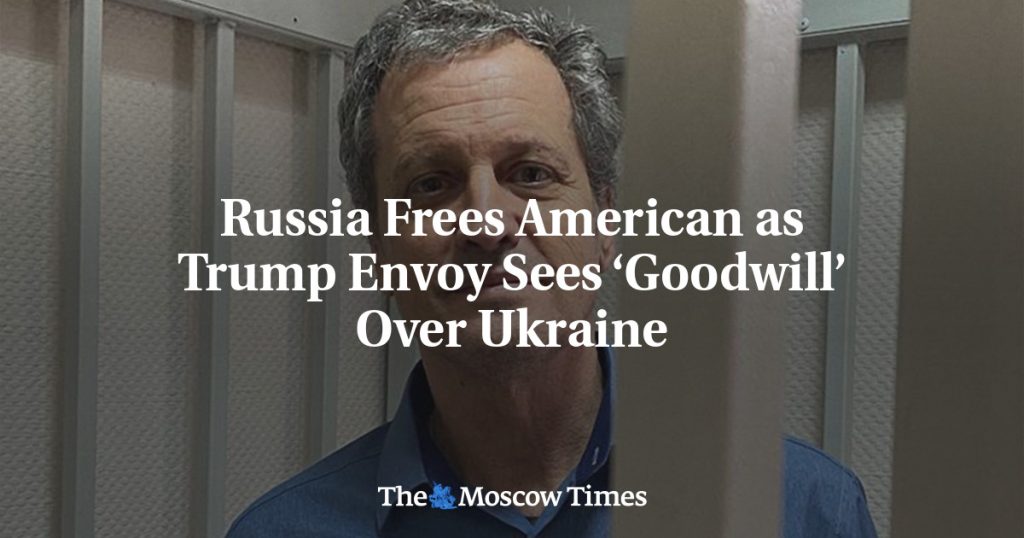A Glimmer of Hope: The Release of Marc Fogel and Its Significance
In a rare and welcoming development amid the ongoing tensions between Russia and the United States, Moscow released American citizen Marc Fogel on Tuesday. Fogel, a 63-year-old teacher, had been imprisoned in Russia since 2021 on drug charges. His release was facilitated by a diplomatic effort led by Steve Witkoff, a property developer and a friend of former President Donald Trump, who serves as Trump’s envoy for the Middle East. Witkoff held talks in Russia and departed the country with Fogel, marking a significant breakthrough in a relationship strained by the war in Ukraine. The White House described the release as part of an "exchange," though details of the arrangement remain unclear. National Security Advisor Mike Waltz called the move a "show of good faith" by Russia and a positive step toward ending the brutal conflict in Ukraine.
A Rare Diplomatic Engagement
Witkoff’s visit to Russia is notable, as it represents one of the first known visits by a senior U.S. official to the country in recent years. Since Russia’s invasion of Ukraine in February 2022, the Biden administration has severely limited direct communication with Moscow, though some intelligence officials have met secretly in third countries. Witkoff, who had previously played a role in negotiating a fragile ceasefire between Israel and Hamas, emerged as an unlikely figure in this diplomatic effort. His involvement underscores Trump’s unconventional approach to foreign policy, which often relies on personal relationships and non-traditional envoys. The release of Fogel, however, has been welcomed as a rare piece of good news in an otherwise fraught relationship.
Fogel’s Long and Challenging Journey
Marc Fogel’s ordeal began in August 2021, when he was arrested at Moscow’s Sheremetyevo Airport for carrying 21 grams of cannabis and cannabis oil. Fogel, a Pennsylvania native, had been teaching English in Russia since 2012 and was a respected figure at the Anglo-American School in Moscow. His family has consistently maintained that the charges against him were unjust, and in August, the Biden administration officially classified him as "wrongfully detained." Despite his deteriorating health, Fogel reportedly continued teaching English to fellow inmates in his penal colony. His family expressed relief at his release, though they had previously voiced frustration that he was not included in earlier prisoner swaps, such as those that freed high-profile Americans like Brittney Griner and Paul Whelan.
The Broader Context: Ukraine and U.S.-Russia Relations
The timing of Fogel’s release coincided with heightened diplomatic activity related to the war in Ukraine. Just hours before the announcement, Trump revealed that Treasury Secretary Scott Bessent would visit Ukraine to meet with President Volodymyr Zelensky. Bessent’s trip, though unrelated to his primary role overseeing finances, signals an effort by the Trump administration to engage with Kyiv amid ongoing conflict. Meanwhile, U.S. Vice President J.D. Vance is also set to meet Zelensky at the Munich Security Conference. These developments occur as both Russia and Ukraine seek to gain an advantage on the battlefield ahead of potential peace talks. Ukraine’s military recently claimed to have struck an oil refinery in Russia’s Saratov region, while Russia announced the capture of a small village in the eastern Donetsk region.
Reactions to Trump’s Remarks on Ukraine
Trump’s recent comments on Ukraine have sparked controversy, with some interpreting them as an endorsement of Russian territorial claims. In a Fox News interview, Trump suggested that Ukraine "may be Russian someday," a statement that was quickly embraced by the Kremlin. Russian spokesman Dmitry Peskov referenced the 2022 annexation of four Ukrainian regions, which were widely condemned as illegal by the international community. In response, Ukrainians expressed outrage and disbelief, with many questioning Trump’s understanding of the situation. "It is some kind of senile insanity," said one Kyiv resident, while a Ukrainian soldier dismissed Trump’s remarks, stating, "Ukraine will never be Russia."
Looking Ahead: Diplomacy and the Road to Peace
While Marc Fogel’s release offers a glimmer of hope for improved relations between the U.S. and Russia, the path to ending the Ukraine war remains fraught with challenges. Both sides are digging in for a prolonged conflict, with heavy losses reported on the battlefield. The U.S. has continued to provide military and economic support to Ukraine, while Russia seeks to consolidate its territorial gains. Diplomatic efforts, such as Witkoff’s visit and Bessent’s upcoming trip, suggest that behind-the-scenes discussions are ongoing, but a resolution to the conflict remains elusive. For now, the release of Marc Fogel serves as a reminder that even in the darkest moments, there is room for humanitarian gestures and the possibility of dialogue.












